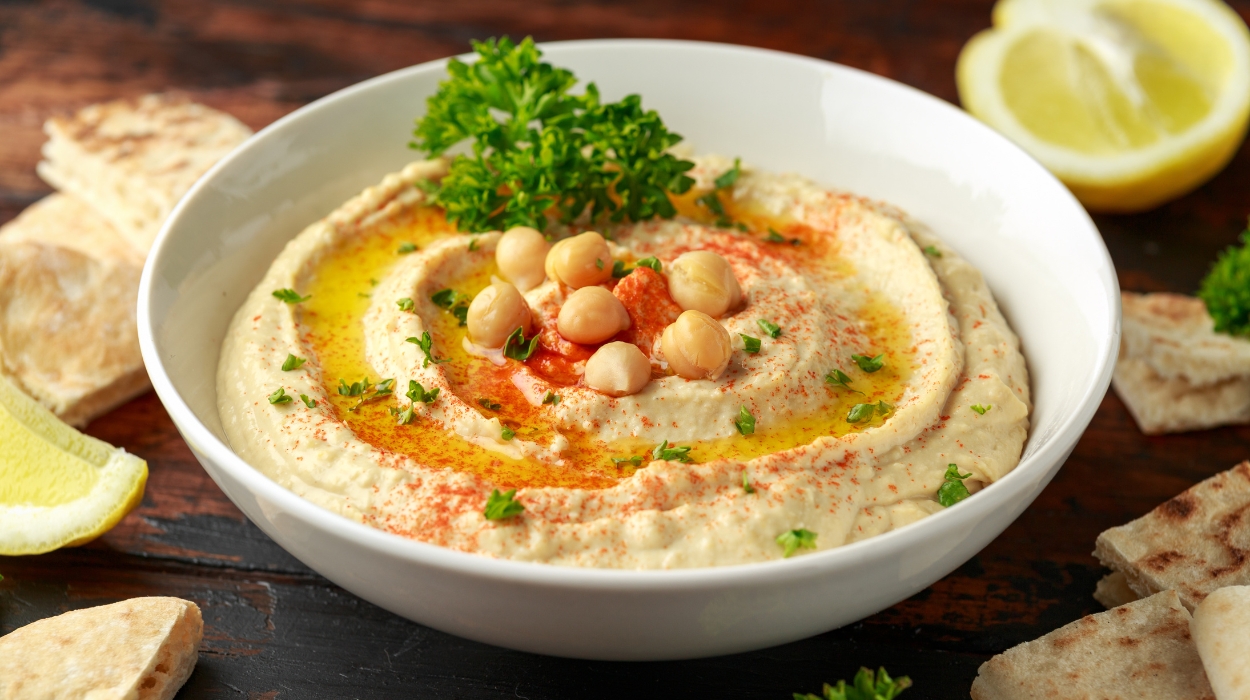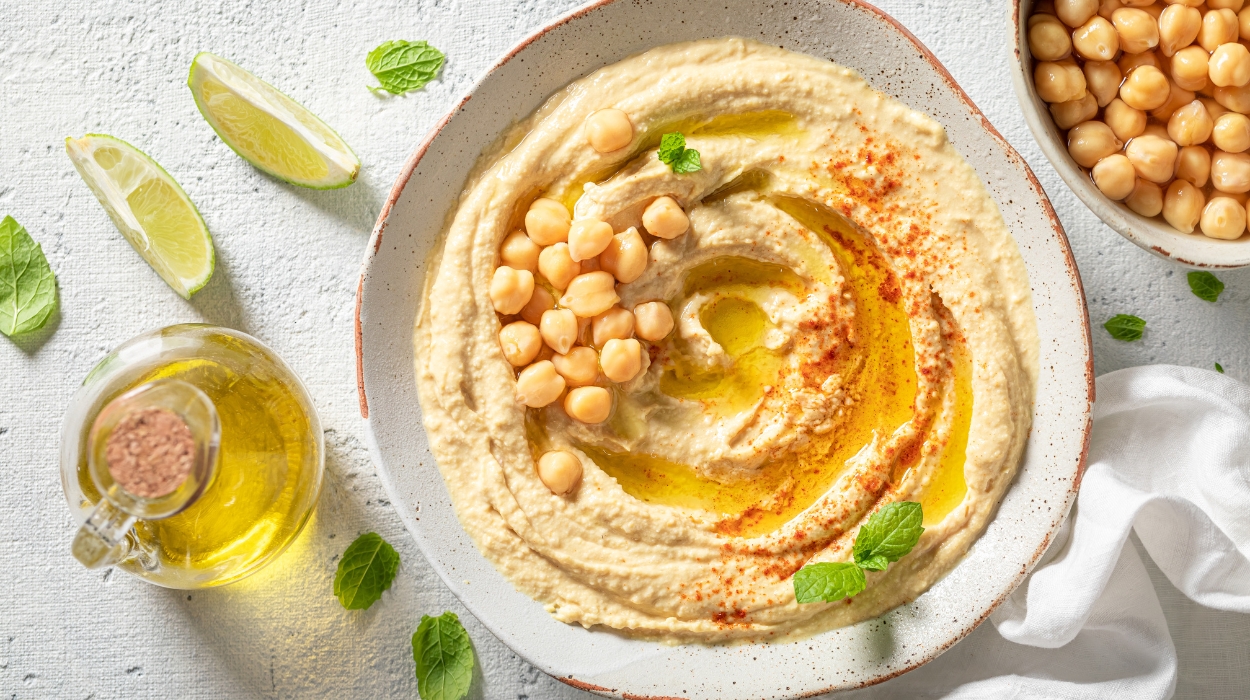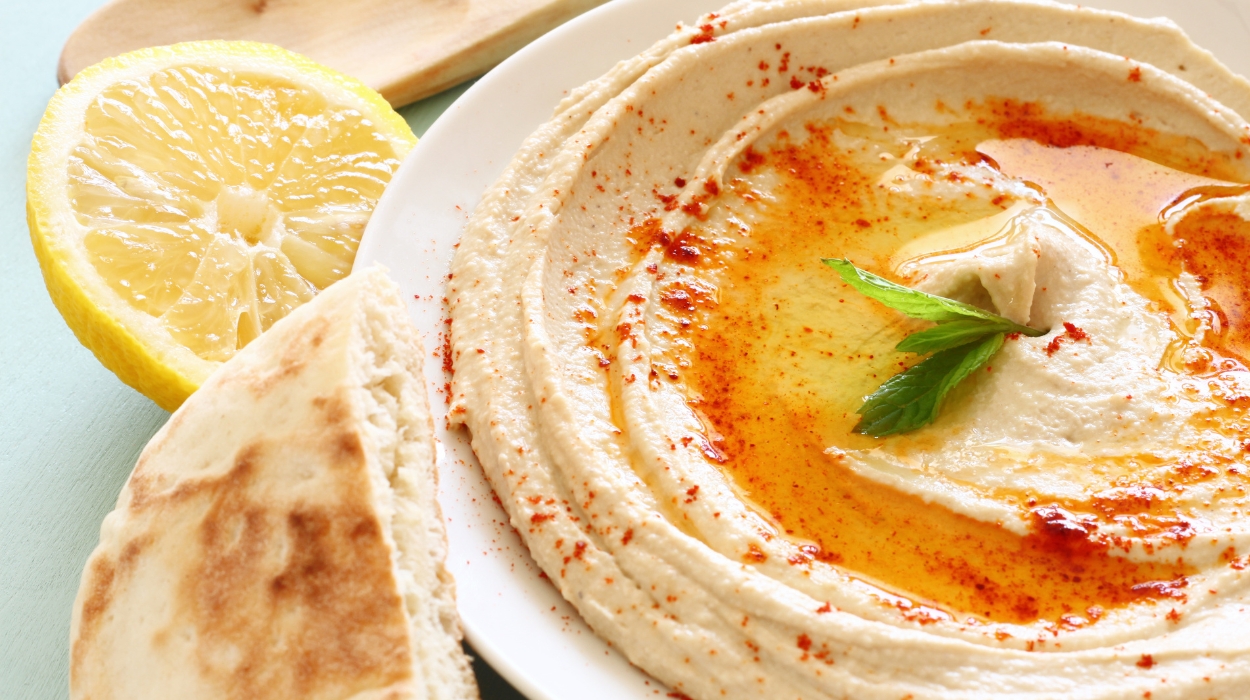 Expert's opinion
Expert's opinion
Expert's opinion
The article is a subjective view on this topic written by writers specializing in medical writing.
It may reflect on a personal journey surrounding struggles with an illness or medical condition, involve product comparisons, diet considerations, or other health-related opinions.
Although the view is entirely that of the writer, it is based on academic experiences and scientific research they have conducted; it is fact-checked by a team of degreed medical experts, and validated by sources attached to the article.
The numbers in parenthesis (1,2,3) will take you to clickable links to related scientific papers.
Is Hummus Gluten-Free & Beneficial For Health In 2024?

If you have celiac disease[1] or feel sick when you eat anything containing gluten, you probably double and triple-check your favorite food product labels. And if you’re a hummus lover, you may ask yourself, “Is hummus gluten-free?”.
In this article, we will shed light on the nutritional benefits of hummus and the potential gluten sources that might hide within its ingredients or production process. Get ready to learn how to navigate the hummus aisle confidently, whether you are simply seeking a gluten-free lifestyle or are following a weight-loss diet.
Does Hummus Have Gluten?
Yes, hummus is generally considered gluten-free. It is made primarily from chickpeas, tahini, garlic, lemon juice, and olive oil.
However, it’s essential to read labels and choose certified gluten-free brands to avoid any potential cross-contamination or additives. Making homemade hummus is also a great way to ensure it remains gluten-free.
Is Hummus Gluten-Free?
The big question now is, is there gluten in hummus? Generally, hummus is gluten-free. This is because the traditional ingredients found in hummus are naturally gluten-free.
This means that hummus is generally suitable for individuals with gluten sensitivities, celiac disease, or those who prefer gluten-free foods. However, it’s important to note that not all store-bought or commercially prepared hummus products are gluten-free. Some brands may include additional ingredients or additives that could contain gluten.
A few ingredients to look for include Brewer’s yeast, dextrins, or mixed spices like turmeric and paprika combined. When certain herbs are combined, it’s possible that a small amount of gluten-containing flour was added during processing to prevent caking.
Cross-contamination[2] can also occur if the packaged hummus is prepared in a facility that processes gluten-containing ingredients. If this is the case, the label should have a disclaimer.
What Ingredients Is Hummus Made From?

To appreciate the culinary mastery behind this cherished dip, we need to know the essential building blocks that make up the traditional hummus.
Although hummus offers a versatile canvas for delicious experimentation, it is made from a few simple ingredients[3]:
- Chickpeas: Chickpeas, also called garbanzo beans, are at the heart of hummus. These legumes are the main ingredient, giving the dip a creamy texture and a delightful nutty flavor.
- Tahini: This is a paste made from ground sesame seeds, and it adds a velvety smoothness to the dip.
- Olive oil: Olive oil plays a crucial role in perfecting the taste and texture of hummus, improving its flavor profile.
- Lemon juice: Freshly squeezed lemon juice is a vital ingredient that adds a tangy kick to hummus.
- Garlic: No hummus is complete without the aromatic addition of garlic. Raw garlic cloves lend a pungent and savory taste, infusing the dip with a robust flavor.
- Salt: This is a crucial ingredient that brings out the flavors and harmonizes the overall taste of hummus.
Benefits Of Gluten-Free Hummus
Why is hummus good for you? Gluten-free hummus offers several benefits, especially for individuals with gluten sensitivities and those following a gluten-free diet. Here are some of the key benefits[3]:
Suitable For Gluten Sensitivities And Celiac Disease
Gluten-free hummus offers a safe and tasty choice for individuals with gluten sensitivities or celiac disease,[4] reducing the risk of digestive issues like bloating, abdominal discomfort, and diarrhea.
Promotes Diet Variations In A Gluten-Free Lifestyle
Choosing gluten-free hummus helps individuals maintain a gluten-free lifestyle. You can enjoy a wide range of foods alongside hummus while adhering to your gluten-free dietary needs.
Gluten-free alternatives like hummus can be a tasty addition to gluten-free wraps, sandwiches, and salads, expanding dietary options.[5]
Nutritional Benefits
Gluten-free hummus recipes provide similar nutritional benefits to regular hummus ones. It is packed with protein, dietary fiber, essential vitamins, minerals, and healthy fats from ingredients like chickpeas, tahini, olive oil, and lemon juice.
These nutrients support muscle health and provide calcium, heart-healthy fats, vitamin C, and antioxidants.
Satiety And Weight Management
Gluten-free hummus, with its protein, fiber, and healthy fats, can contribute to feelings of fullness and help control appetite. If you’re looking for healthier snack options besides your favorite gluten-free protein powder, the delicious hummus can be one of the best snacks for weight loss.
How To Make Gluten-Free Hummus?

Making homemade gluten-free hummus is a relatively straightforward process. The result is a delicious, gluten-free, fat-burning dip suitable for various dietary needs. By making it yourself, you’ll have more control over what you eat, and it is also a great way to add more personalized vitamins to your diet.
Below is an easy gluten-free hummus recipe. The ingredients[6] required include:
- One can of chickpeas, drained and rinsed.
- One cup of tahini or sesame seed paste.
- Three minced cloves of garlic.
- Juice from one fresh lemon.
- Two tablespoons of extra-virgin olive oil.
- One teaspoon of ground cumin.
- Salt and pepper to taste.
- Water as needed for desired consistency.
- Optional toppings: olive oil, paprika, chopped fresh parsley, or sesame seeds.
Steps To Make Gluten-Free Hummus
- Rinse and drain the chickpeas: Open the can of chickpeas and drain the liquid. Rinse the canned chickpeas thoroughly under cold water to remove any excess salt or debris.
- Blend the chickpeas: In a food processor or blender, add the drained chickpeas, tahini, minced garlic, lemon juice, olive oil, ground cumin, salt, and pepper.
- Blend until smooth: Blend the ingredients until the mixture becomes smooth and creamy. Pause occasionally to scrape down the sides of the bowl and ensure all the ingredients are well combined. If the mixture appears too thick, gradually add water, one tablespoon at a time, until you achieve the desired consistency.
- Taste and adjust the seasonings: Pause the blending process and taste the hummus. Adjust the seasoning to suit your preference by adding more lemon juice, salt, or pepper as needed. Voila! Your creamy gluten-free hummus is ready to be devoured.
- Serve and garnish: Transfer the gluten-free hummus into a serving bowl. Drizzle some olive oil on top and sprinkle with paprika, chopped fresh parsley, or sesame seeds for added flavor and presentation. You can serve as a dip, spread, or salad dressing.
If there are any leftovers, you can store them in an airtight container and refrigerate them.
More Healthy Gluten-Free Snack Ideas
Listed below are a few enticing and healthy gluten-free snacks to satisfy your cravings:
- Quinoa salad cups.
- Roasted chickpeas.
- Chia seed pudding.
- Rice cakes with avocado.
- Gluten-free meal replacement bars.
- Veggie sticks with hummus.
- Rice paper rolls.
- Greek yogurt with berries.
- Fresh fruits and vegetables.
The Bottom Line
Hummus is generally considered a gluten-free food made from naturally gluten-free ingredients. However, it is crucial to read the ingredient labels carefully, as some store-bought brands may include additives or present cross-contamination risks.
Suppose you have celiac disease or severe gluten intolerance. In that case, opting for certified gluten-free hummus or preparing your own at home to ensure its gluten-free status is advisable. With the right ingredients and precautions, you can enjoy this delectable and versatile dip as part of a gluten-free lifestyle.
And if you want to make your gluten-free meal prep easier, gluten-free meal delivery services are available to cater to your needs.
Frequently Asked Questions
Yes, you can eat hummus on a gluten-free diet if it is made with gluten-free ingredients and does not contain any cross-contamination risks.
Hummus is primarily made from chickpeas, tahini, garlic, lemon juice, and olive oil, blended to create a creamy and flavorful dip.
Store-bought hummus may or may not be gluten-free. It’s essential to read the ingredient labels carefully, as some brands may include gluten-containing additives or present cross-contamination risks.
Hummus is naturally gluten-free and dairy-free as it is made from chickpeas, tahini, garlic, lemon juice, and olive oil. However, checking the ingredient label to ensure no added gluten or dairy is still advised.
No. Pure, natural nuts do not have gluten. However, some commercially manufactured nuts may contain gluten if they are made with flavors or seasonings that contain gluten.
+ 6 sources
Health Canal avoids using tertiary references. We have strict sourcing guidelines and rely on peer-reviewed studies, academic researches from medical associations and institutions. To ensure the accuracy of articles in Health Canal, you can read more about the editorial process here
- Seyede Marzieh Hosseini, Nafiseh Soltanizadeh, Parisa Mirmoghtadaee, Parisa Banavand, Mirmoghtadaie, L. and Saeedeh Shojaee‐Aliabadi (2018). Gluten-free products in celiac disease: Nutritional and technological challenges and solutions. Journal of Research in Medical Sciences, [online] 23(1), pp.109–109. doi:https://doi.org/10.4103/jrms.jrms_666_18.
- Wieser, H., Segura, V., Ángela Ruiz-Carnicer, Sousa, C. and Comino, I. (2021). Food Safety and Cross-Contamination of Gluten-Free Products: A Narrative Review. Nutrients, [online] 13(7), pp.2244–2244. doi:https://doi.org/10.3390/nu13072244.
- Wallace, T.C., Murray, R. and Zelman, K.M. (2016). The Nutritional Value and Health Benefits of Chickpeas and Hummus. Nutrients, [online] 8(12), pp.766–766. doi:https://doi.org/10.3390/nu8120766.
- Melini, V. and Melini, F. (2019). Gluten-Free Diet: Gaps and Needs for a Healthier Diet. Nutrients, [online] 11(1), pp.170–170. doi:https://doi.org/10.3390/nu11010170.
- Reister, E.J., Belote, L.N. and Leidy, H.J. (2020). The Benefits of Including Hummus and Hummus Ingredients into the American Diet to Promote Diet Quality and Health: A Comprehensive Review. Nutrients, [online] 12(12), pp.3678–3678. doi:https://doi.org/10.3390/nu12123678.
- Wallace, T.C., Murray, R. and Zelman, K.M. (2016). The Nutritional Value and Health Benefits of Chickpeas and Hummus. [online] ResearchGate. Available at: https://www.researchgate.net/publication/311158412_The_Nutritional_Value_and_Health_Benefits_of_Chickpeas_and_Hummus.



